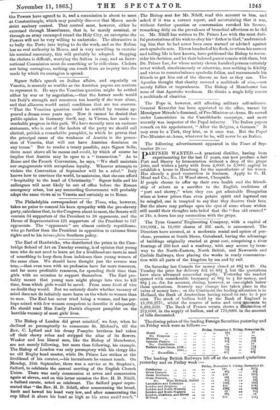Signor Sella's speech on Italian affairs, and especially on Venetia,
is scarcely so warlike as the Austrian papers are anxious to represent it. He says the Venetian question might be settled either by war or by negotiation,—that the former mode would tax Italy's strength and resources too heavily if she were alone, and that alliances would entail conditions that are too onerous. 4‘ That the Venetian question could be settled by treaties ap- peared a dream some years ago. Now it cannot be denied that public opinion in Germany itself, nay, in Vienna, has made re- markable progress in this path. We have recently seen an eminent statesman, who is one of the leaders of the party we should call .clerical, publish a remarkable pamphlet, in which he proves that the principal cause of the weakness of Austria is the posses- sion of Venetia, that will not have Austrian dominion on any terms." But to render a treaty possible, says Signor Sella, there must above all be means and credit, by which of course he implies that Austria may be open to a " transaction." As to Rome and the French Convention, he says, " We shall maintain our engagements with scrupulous loyalty. Whoever attempts to violate the Convention of September will be a rebel." Italy Inows how to convince the world, he maintains, that she can afford "hospitality to the head of Christianity." Signor Sella and his -colleagues will most likely be out of office before the Roman emergency arises, but any succeeding Government will probably adopt the same views as to Venetia and certainly as to Rome.






























 Previous page
Previous page